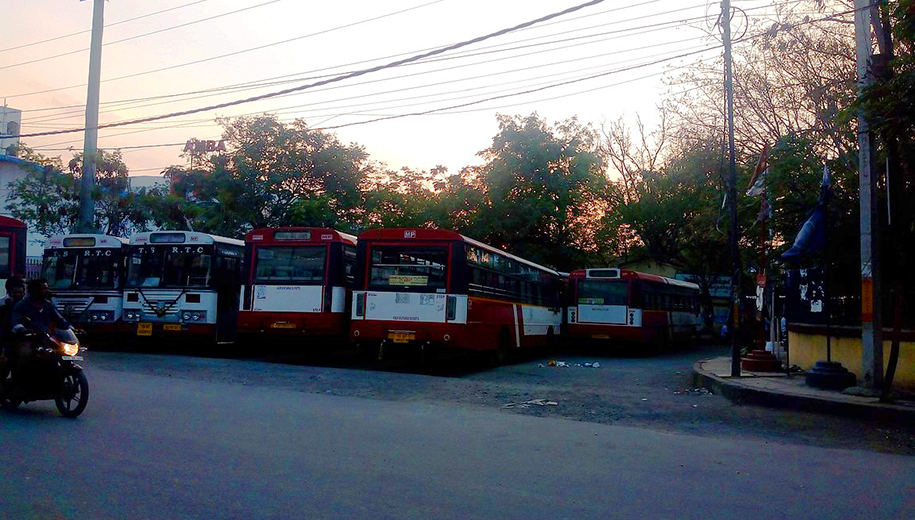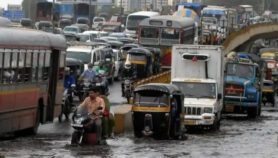02/04/20
India’s COVID-19 lockdown forces exodus of migrant workers

By: Ranjit Devraj
Send to a friend
The details you provide on this page will not be used to send unsolicited email, and will not be sold to a 3rd party. See privacy policy.
[NEW DELHI] When Nandlal, the cheerful young man who runs errands for me, telephoned to say that he and his family of a wife and two small children were on their way to their village in Budaun district, more than 250 kilometres east of Delhi, I was surprised.
That was the second day of a three-week national lockdown called by Prime Minister Narendra Modi to contain spread of COVID-19. That meant all train, bus and other transport services across the vast sub-continent stood suspended from 25 March until 14 April — as also all shops, businesses and institutions.
“We are walking to Budaun and should be there in a couple of days,” Nandlal said. “The landlord evicted us and the car workshop where I have a day job is closed.” Nandlal’s predicament was shared by India’s 200 million internal migrant workers. Uncertain of their future in cities and facing starvation, they were left with no option but to return to the distant villages they had abandoned in search of urban pastures.
“Two hundred million migrant workers is no small number and they contribute hugely to the economy of the cities — about time they got a fair deal, coronavirus or not”
A. R. Sindhu, Centre Indian Trade Unions
Across India’s metropolises, migrant workers began hitting the highways a day or two after the sudden lockdown. Balancing small children and baggage on their heads and shoulders and braving policemen enforcing the lockdown with batons they headed home — some up to more than 700 kilometres.
Since Modi’s televised announcement was made just four hours before the midnight lockdown, they had little chance to pick up provisions for the road and had to depend on packets of biscuits distributed by NGOs. By 30 March, at least 25 of the marchers had perished either through exhaustion from walking long distances on the blisteringly hot highways or after being hit by speeding trucks.
It soon became apparent that these millions of carpenters, plumbers, electricians, cooks, waiters and factory hands were not covered by law to protect their basic rights as employees or as tenants. Official concern was limited to stopping them from spreading the highly contagious COVID-19 into India’s hinterland — even if that meant spraying them with disinfectants along the way.
Petitions in the Supreme Court to get the government to help the stranded workers drew the judicial observation that the panic from the lockdown appeared worse than the virus. The government was forced to admit in court that more than half a million people were on the move, defying the lockdown and walking from the cities to the villages.
As criticism mounted against the failure to anticipate the exodus, the police stopped swinging their batons at the migrant workers and were instead seen distributing food packets. State borders were sealed to stop further movement and officials who had arranged for buses to help the trekkers were placed under suspension.
The government did announce, on day two of the lockdown, a package worth US$22.6 billion to cover direct cash transfers and food relief, but this was criticised by experts as falling far short of requirements for the marginalised in a population of 1.3 billion people. In any case, none of that reached the migrant workers because they did not have the right papers.
As late as 29 March, five days into the lockdown, the central government was still ordering provincial administrations to heed instructions on “stopping the movement of migrants and providing them with quarantine facilities, shelters, food etc. and ensuring payment of wages and non-eviction by their landlords. Its strict implementation needs to be ensured”.“Such instructions are fine but what we would like to see is statutorily enforceable protection for migrant workers and recognition of their basic rights,” says A. R. Sindhu, national secretary of the Centre Indian Trade Unions. “Two hundred million migrant workers is no small number and they contribute hugely to the economy of the cities — about time they got a fair deal, coronavirus or not.”
Nandlal couldn’t say when or if he and his family would return to Delhi. “I am in no hurry to get back. Farming my fields is better than a hand-to-mouth existence in the city.”
This piece was produced by SciDev.Net’s Asia & Pacific desk.













